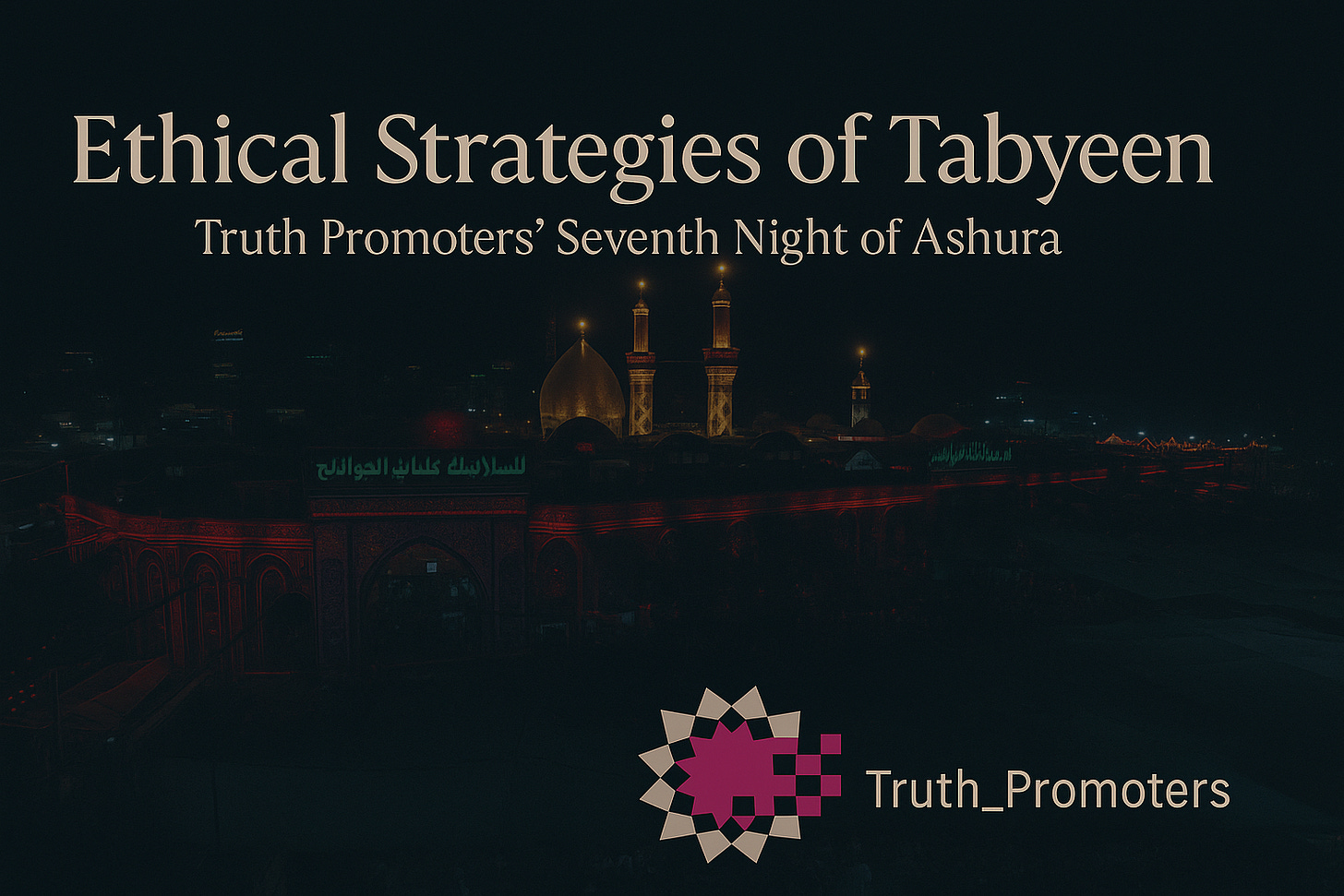Ethical Strategies of Tabyeen: Truth Promoters’ Seventh Night of Ashura
The goal of tabyeen is not to overwhelm with information, but to awaken meaning—to speak to people’s realities, not just their ears.
PUREWILAYAH.COM — The Truth Promoters’ Ashura 2025 series entered its seventh night with a focus on tabyeen—not as theory, but as lived, ethical communication.
The live program featured a keynote lecture by Sheikh Shabbir Hassanally, accompanied by a spiritually immersive sequence of Qur’anic recitation, poetic couplets, maqtal, noha, and Ziyarah Ashura. All segments are now available for multilingual access via the Hyder AI platform.
📺 Watch the full livestream here:
Clarification as Care: The Art of Reaching Hearts
In his lecture titled “Clarification: Methods and Types,” Sheikh Shabbir Hassanally offered a profound exploration of tabyeen as both a duty and an art form—one that requires self-awareness, cultural literacy, and emotional intelligence. He emphasized that the goal of tabyeen is not to overwhelm with information, but to awaken meaning—to speak to people’s realities, not just their ears.
He opened by asserting that the Prophet Muhammad was more than a conveyor of divine facts; he was a physician of the soul, who knew when to be silent, when to speak gently, and when to act symbolically. This prophetic model, Sheikh Shabbir argued, is central to how Muslims must communicate in today’s fragmented world.
“One must take into consideration the level of the audience, the language of the audience, and the culture of the audience, and only then can the message be most effectively conveyed.”
He warned against the rise of performative activism—where the truth becomes diluted in noise, outrage, or social media trends. Instead, he called for spiritually grounded clarity, rooted in sincerity, creativity, and a disciplined inner life.
“We must consider how our words will land, how our words will be received, and whether we are speaking to express or to truly communicate something meaningful.”
A key part of the lecture addressed the importance of non-verbal da’wah: the quiet power of character, art, storytelling, and presence. The Prophet’s legacy, he reminded, lives in the advice to “be callers without your tongues.” In a world saturated with words, it is the action, the consistency, the silent dignity of the believer that often carries the heaviest truth.
He urged communities to form knowledge circles and grassroots intellectual hubs—not as elite gatherings, but as spaces of listening, reflection, and training. The aim, he emphasized, is not quantity but preparedness: “The Imam of our time is not waiting for numbers, but for quality—for the few who are ready.”
🖋️ Full majlis article:
The Martyrdom of Abbas: Loyalty Without Limit
This night’s maqtal commemorated the fall of Abul Fadhl al-Abbas—the flagbearer of Karbala, whose unmatched valor and brotherly love remain etched in the soul of Ashura.
Abbas, refusing enemy offers of safety, chose to remain by Imam Husayn’s side until the very end. With both arms severed and his body pierced by arrows, Abbas still clutched the water he hoped to deliver to the children of the camp.
His final request was simple: not to be carried back, but to be left where he fell—too ashamed to face the family without fulfilling his mission. The grief of Imam Husayn over Abbas’s body was palpable, a wound that echoed through the generations.
📜 Full maqtal reading:
“Ode to Abbas”: A Noha of Grief and Glory
The noha segment, titled “Ode to Abbas,” unfolded like a dirge from the heart. Through melody and lament, it recounted Abbas’s final moments, his silent plea, and the unbearable absence he left behind.
The lyrics captured not just the battlefield, but the emotional devastation of Karbala—particularly for Sakina, whose thirst remained unquenched.
🎵 Listen to the full noha:
Communion through Ziyarah: A Covenant Rekindled
Closing the program was Ziyarah Ashura, offered in a poetic form titled “The Communion of Ashura.” More than a text, it became a living link—between the present-day mourner and the eternal cause of Karbala. The words of the Ziyarah were not merely read, but felt—as a renewal of loyalty, grief, and resistance.
🕊️ Read the Ziyarah:
🌐 Multilingual Access via Hyder AI
As confirmed by a Truth Promoters spokesperson to Pure Wilayah, all lectures by Sheikh Shabbir—alongside related Ashura content—are available in multiple languages via the Hyder AI platform. This collaboration ensures that the message of tabyeen, and the spirit of Ashura, transcend barriers of language and geography. (PW)





